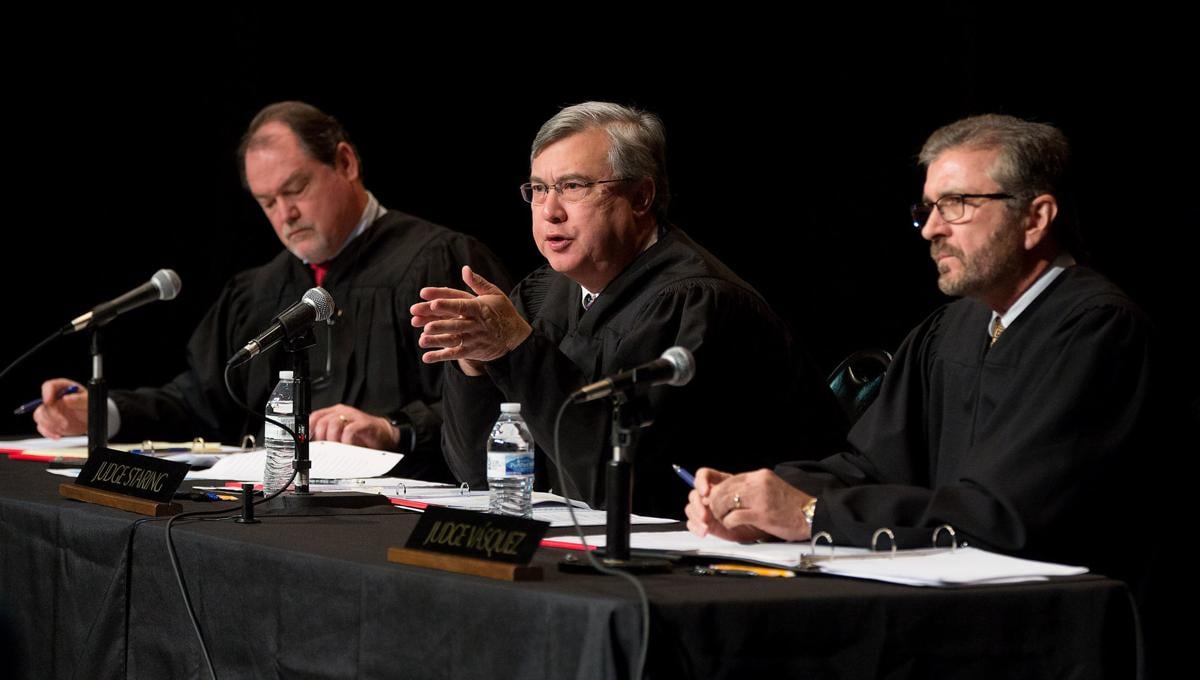PHOENIX — A bid by the Goldwater Institute to change how judges on the Court of Appeals stand for election drew a skeptical response Monday from a judge.
Maricopa County Superior Court Judge Frank Moskowitz acknowledged the current system means only residents of certain counties get to vote on whether appellate judges, all appointed by the governor, get to continue to serve. But he said that does not mean residents of other counties are disenfranchised by the judges’ rulings, which have statewide effect.
In fact, Moskowitz said, any ruling he issues in this case, even as a judge elected only by Maricopa County residents, would have statewide effect in the sense that, unless appealed, his decision would determine which judges will and will not be on the Nov. 5 ballot statewide.
That left attorney Andrew Gould, arguing for the Goldwater Institute, trying to convince Moskowitz that he doesn’t have statewide authority — even as Gould argued he does have the power to order the secretary of state to put the names of all appellate judges up for election this year on the ballots in all 15 counties.
Assistant Attorney General Emma Mark, defending the current system, accused the Goldwater Institute of trying to get Moskowitz to do something its Republican allies at the Legislature could not: change the election system.
Moskowitz indicated he was leaning toward tossing the institute’s lawsuit but reserved final judgment. He said he will try to expedite a ruling on the lawsuit, which asks the judge to rule that all Arizonans get to vote on all appellate judges regardless where they live.
That would not be the end of the issue. Gould said the case ultimately would go to the Arizona Supreme Court.
A quick final ruling is necessary.
Counties will start printing their ballots around the third week of August. They need to know what names and races will go to which voters.
Complex current system
Appellate judges, appointed by the governor, must stand for reelection on a retain-reject basis every six years.
But the appellate court is set up by state law as as two division, and the voting is even more complex than that.
For example, someone who lives in Pima County, in Division II of the Court of Appeals, can vote to retain or reject only appellate judges who were selected by the governor from that county. Residents of the other counties in Division II — Pinal, Cochise, Santa Cruz, Greenlee, Graham and Gila counties — can cast ballots only for judges picked from among those six counties.
The same situation exists in Division I, with Maricopa County residents entitled to vote on the future of appellate judges only from their county, and residents of Yuma, La Paz, Mohave, Coconino, Yavapai, Navajo and Apache counties entitled to weigh in only on appellate judges from those seven counties.
But all appellate court rulings are binding on all of the state. That is especially true given that only a small percentage of those cases ever wind up before the state Supreme Court, meaning the appellate ruling is the last word.
Gould told Moskowitz that means someone’s case could ultimately be decided by judges whom that person never had a right to vote for or against.
By contrast, all Arizona voters get to cast ballots on whether to retain or reject every justice on the Arizona Supreme Court.
“Voters are disenfranchised because they can’t vote for certain judges,’’ Gould said.
Mark told Moskowitz that is legally irrelevant. “Judges don’t represent people,’’ she said, in comparison to state lawmakers. “They serve people.’’
Judge points out exceptions
The judge himself said there are flaws to Gould’s argument about ensuring all voters get a say.
Consider, he said, the fact that the Supreme Court is entitled to call back judges from retirement to hear cases, not only in trial courts but also appellate courts.
“No Arizonan is ever going to vote for those pro-tem judges,’’ Moskowitz said. These temporary judges are “never going to be in a retention election that somebody can necessarily all vote for.’’
And those decisions are binding, the judge noted.
Moskowitz also pointed out that Superior Court judges from one county can be called upon to hear cases in other counties.
Legislative attempt was vetoed
This isn’t the Goldwater Institute’s first bid to nullify the system. In its role of arguing for limited government, it is involved in many lawsuits to overturn legislative or local government decisions.
On a party-line vote in 2023, the Republican-controlled Legislature approved a proposal by House Speaker Ben Toma, backed by Goldwater, to require all Court of Appeals judges to stand for retention on a statewide basis. No one testified against it.
But Democratic Gov. Katie Hobbs vetoed the measure, saying the proposed cure was worse than the current situation.
“Allowing voters statewide to vote on whether to retain all of Court of Appeals judges regardless of the judge’s division assignment, while retaining the division structure, would unfairly dilute the votes of those Arizonans most directly impacted by each division’s judges,’’ she wrote.
Mark told Moskowitz that’s critical to what the Goldwater Institute now wants him to do.
“They are asking this court to rewrite the judicial retention election statutes to achieve what they could not achieve legislatively,’’ she said.
There’s another complication.
Moskowitz said even if he agreed with Goldwater, the only thing he could do is declare the current system illegal.
That would merely mean there would be no retention election for appellate judges this year, he said. It would then be up to lawmakers to make a fix — and somehow do it before the August deadline. The judge said he’s not going to create a new system from the bench.
“That’s for the Legislature and other powers, not for this court,’’ he said.





